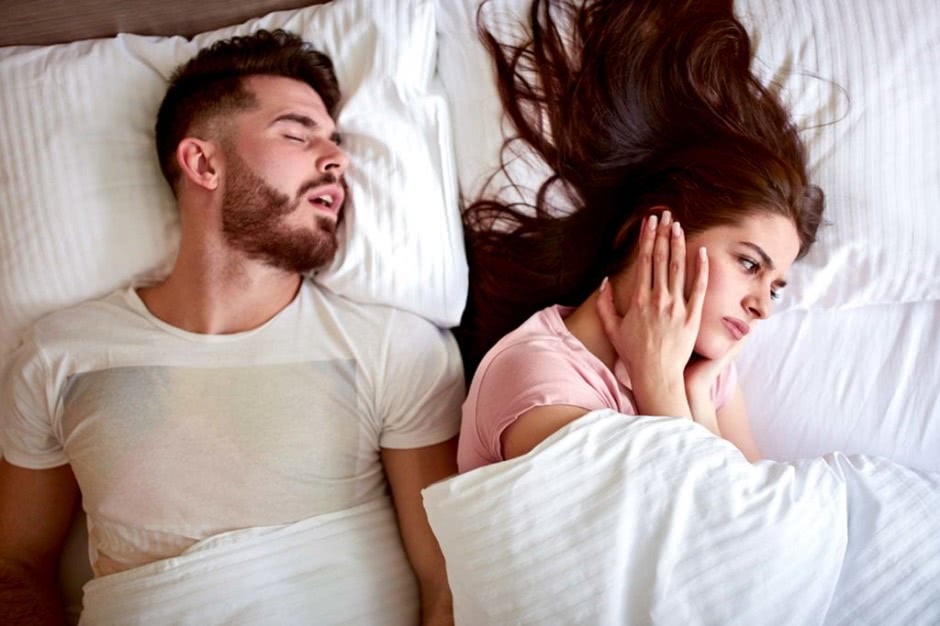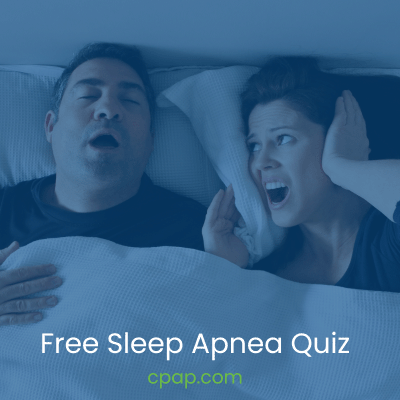Is snoring waking you or your partner up throughout the night? Are you questioning whether you have sleep apnea because of your nightly snores? Well, let’s start by debunking a myth—not everyone who snores has sleep apnea.
While snoring and sleep apnea have their similarities and common risk factors, the root of snoring and the differences between the two result in separate treatments.
Now, what’s the difference between snoring and sleep apnea? Let’s find out!
What’s the Difference Between Snoring and Sleep Apnea?

The difference between simple snoring and sleep apnea is that snoring results when your throat relaxes and the tissues of your throat vibrate as your breathe while with Obstructive Sleep Apnea, your airway is obstructed or blocked completely, causing gaps in your breathing. With sleep apnea, your breathing starts and stops throughout the night and causes the level of oxygen in your blood to drop as a result of a complete blockage in your airway. Unlike sleep apnea, snoring does not cause unsafe drops in your blood oxygen levels.
Another difference between snoring and sleep apnea is how you feel after waking up and throughout the day. Snoring may keep your partner awake, but it may not wake you up throughout the night. However, if you have sleep apnea, your sleep quality will be affected, causing you to feel exhausted and fatigued throughout the day. The poor sleep quality and daytime sleepiness associated with sleep apnea can often lead to mood swings, depression, and unproductive days.
To differentiate between snoring and sleep apnea, let’s examine the type of snoring occurring throughout the night. With sleep apnea, your snoring will be more frequent and louder. When you snore with sleep apnea, you will often wake up gasping for air. The sound of snoring with sleep apnea will sound more like a choking noise.
What Are the Similarities Between Snoring and Sleep Apnea?
The similarities between snoring and sleep apnea exist in some of the overlapping symptoms. With both simple snoring and undiagnosed sleep apnea, you can wake up with a dry mouth or sore throat. If you are snoring throughout the night whether because of simple snoring or sleep apnea, you are sleeping with your mouth open, which leaves no barrier for germs to enter into your body, increasing the likelihood of illness.
Another prominent similarity between snoring and sleep apnea is the risk factors. Weight is a large contributor to both snoring and sleep apnea. Through weight gain, those who snore or have sleep apnea may have a narrowed airway, causing simple snoring or sleep apnea in the process. Nasal construction or congestion can lead to both snoring or sleep apnea. If your nasal passages are chronically congested or if you have a deviated septum, you may struggle to get consistent breaths throughout the night.
What Causes Snoring?
Around half of the adults in the United States snore, meaning you’re not alone if occasional snoring is a factor in your night.
Snoring is caused by the relaxation of the muscles in your tongue, mouth, and throat. When the tissues relax, they can cause your airway to narrow, leading to vibrations, which create the distinctive snoring sound that can range in noise level.
The Causes of Snoring Are:
- Mouth or Sinus Anatomy
- Alcohol Consumption
- Smoking
- Weight
- Allergies
- Nasal Congestion
- Deviated Septum
- Sleeping Position
When you consume a large amount of alcohol before bed, the alcohol will cause your throat muscles to relax and decrease your body’s natural reflex to keep your airway open and unobstructed. If you sleep on your back, gravity will work against you and cause your throat to narrow. Sleep apnea can also be a cause of snoring.
What Causes Sleep Apnea?
The most common type of sleep apnea, Obstructive Sleep Apnea, is caused by blockages or obstructions in your airway, which causes breathing to stop.
The Causes of Sleep Apnea Are:
- Obesity
- Age
- Gender
- Genetics
- Smoking
- Alcohol Consumption
- Nasal Congestion
Genetically, the size of your neck, throat, tonsils, and adenoids can narrow your airway. As you age, the likelihood of developing sleep apnea increases. If you are a smoker, your upper airway is more likely to be inflamed and retain fluid, which increases your chances of developing sleep apnea.
Does Snoring Mean You Have Sleep Apnea?
No—not all snorers have sleep apnea. If you are a simple snorer, you do not experience periods throughout the night where your breathing stops. If you are experiencing simple snoring, then lifestyle factors such as weight gain, alcohol consumption, sleeping on your back, and smoking could be the culprit.
However, if your snoring is waking you up at night gasping for air or if you experience excessive daytime sleepiness, then take our free sleep apnea test and talk to your doctor to see if sleep apnea is the reason behind your snoring.
Think You May Have Sleep Apnea? Take Our FREE Sleep Apnea Quiz!
If You Snore, Do You Need CPAP Therapy?
CPAP therapy is used to treat Obstructive Sleep Apnea. Following your sleep study, your doctor will prescribe your ideal pressure, mask type and fit, and the machine that best fits your sleep apnea needs.
However, if your snoring doesn’t correlate to sleep apnea, then CPAP therapy will not help solve your snoring since it is not the root of the problem. CPAP therapy helps to maintain the wearer’s airway to prevent breathing pauses. With simple snoring, your airway doesn’t close, making the treatment ineffective.
How to Stop Snoring
The first step in stopping your nighttime snoring is to talk to your doctor or see a sleep specialist. You doctor will discuss your symptoms, sleeping habits, and further testing if necessary.
Losing weight as well as stopping smoking and excessive alcohol consumption are lifestyle changes that can help decrease the likelihood of simple snoring. Try to not sleep on your back to keep your airway clear of the obstructions that cause snoring.
Anti-snoring devices such as mouth sleep strips, sleep noodles, pillow devices, and anti-snoring belts can help alleviate the effects of simple snoring.
Snoring can cause disturbances to you and your partner and leave you with a dry mouth and throat in the morning. However, snoring is not always associated with sleep apnea. If your doctor determines that snoring does not cause your airways to close completely, then try lifestyle changes or anti-snoring devices to get you on your way towards sweet dreams!






One Response
Excellent article!